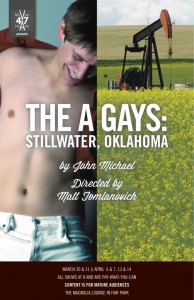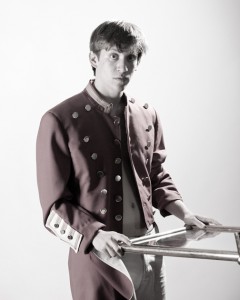Q & A: Solo Performance Artist John Michael on ‘A-Gays’
J ohn Michael introduced Dallas to his unique brand of solo performance with his first show “Do You Want Guys With That?” He chronicled his time working at McDonald’s as a social experiment. His newest show “A-Gays: Stillwater, Oklahoma” builds on his overarching narrative by addressing bullying and his time at an Oklahoma college, where he joined an elite group of gays whose most important rule was “No Uglies Allowed.” When a string of gay suicides comes to national attention, the A-Gays decide to become a presence on campus.
ohn Michael introduced Dallas to his unique brand of solo performance with his first show “Do You Want Guys With That?” He chronicled his time working at McDonald’s as a social experiment. His newest show “A-Gays: Stillwater, Oklahoma” builds on his overarching narrative by addressing bullying and his time at an Oklahoma college, where he joined an elite group of gays whose most important rule was “No Uglies Allowed.” When a string of gay suicides comes to national attention, the A-Gays decide to become a presence on campus.
With four performances left of “A-Gays” at Nouveau 47 Theatre, John Michael spoke with Lauren Smart about his inspiration, truth and being gay.
Lauren Smart: Can you put your inspiration for this show into one sentence?
John Michael: When a person isolates the differences of another, that person is forging an identity as part of the ‘so called’ normal; bullying.
LS: Does this show build off of your previous work?
JM: Yes, “The A-Gays,” along with my first show “Would You Like Guys With That?”  is part of a series of plays that follow growing up and exploring my identity as a gay man. People who have not seen my work will still be able to follow the story line.
LS: How would you define a “solo performance artist”?
JM: A solo performer is a storyteller. With solo-shows, you don’t need lavish sets, all you need is an audience and a performer.
LS: Are you consciously crafting a career as a solo performance artist?
JM: Yes. My goal is to make a living through telling stories. Apart from working on my “cumming of age” trilogy, I am devising a variety act that I could perform for house shows, like what bands do when they start out.
LS: Talking to you is like talking to someone who is having a million thoughts at once, how do you pare those thoughts down to a single idea for a show?
JM: My filter is my audience, which is why I rehearse with friends. Spalding Gray always said you can’t tell a story, if there is no one to listen.
I get a more singular idea or concept from the response of friends when we tell stories. When they repeat something over and over, it is usually a good sign that I’ve found something worth exploring on stage.
LS: We have to talk about the Mike Daisey scandal, because I know you really admire(d) him.
JM: I did admire him greatly and still do. People make mistakes, lucky for me I don’t try to hide anything when telling a story, because all of my shows are centered around colossal mistakes I have made. However damaged my image of Daisey has been since then, my adoration for Ira Glass has grown enormously. His work to uncover the truth and then lay it out for the audience is a terrific piece of storytelling.
LS: How would you define truth? How do you portray truth in your show?
JM: First off my work is not non-fiction, journalism, nor is it based on true events. It’s hyper realized. Truth on stage is whatever can transform ambiguities into tangibles. In my shows, I am the most brutally honest with myself. When creating the arch of my main character, which is me, I identify around five real stories that actually happened to me.  In creating other characters, I often combine two or more real people.
The gay boys I would hang out with in “The A GAYS” and I would joke about how no uglies were allowed to hang out with us. What we were really referring to was the ugliness that was the homophobia and hate there at school, which some of these boys had to encounter on a daily basis growing up gay in Oklahoma. Walking for them on campus, was a protest. They are brave, beautiful and accepting. They are portrayed that way in the show, but I made them less inclusive in order for my character to see remnants of his former bully self.
LS: Is there a character in theatre (any play ever) that you relate to?
JM: Hands down Nick Bottom in “A Midsummer Night’s Dream.” He’s an asshole, but he doesn’t mean to be and there is something so sad about it. It took me a while to realize I had been treating people around me like dirt.  Bottom is the only character in the show that interacts with all the other characters, he weaves the story lines together.  And I so admire that he doesn’t put on airs or change for anyone.It’s something I have had to learn.
LS: Being gay is a central theme in your shows thus far, do you think that will continue?
JM: I will continue to tackle the themes I have been tackling thus far, but I don’t do gay shows. I do coming out shows. Coming out as an asshole, coming out as someone stuck in life, or even coming out to one’s own self, in other words being accountable.
One of the characters in the A-Gays talks about how being called “fat” in school hurt just as much as being called a “faggot” and how much worse it hurt when he was called both names together at the same time, because of the alliteration.
Just because we are different doesn’t mean there has to be a distance between that difference, however, society allows some gay kids to feel so isolated from other kids. By not valuing variance, society is the bully we should be trying to put behind bars.
LS: When did you come out?
JM: I came out on my 21st birthday.
LS: What was important about that time in your life?
JM: When I came out, I bought into the idea that I was so very different than everyone else, because I was gay. I remember identifying myself to other people as “a gay,” which is kind of similar to someone saying that they are an alcoholic. Like in AA, where there are rules people must follow to live a sober life, I thought there were certain rules I had to live by as a gay man. I remember immediately buying a pair of skinny jeans.
This realization that I was just myself took me a while to have, because for the longest time I had a complex with wanting to be unique.
LS: What should the audience expect walking into your show?
JM: Hilarity combined with intimate details shared through a raw, yet inviting performance style.They are going to be asked to root for a character, who is trying so hard not to be an asshole. Spoiler alert. At the end of the show, the audience and I will be friends.
Catch “A-Gays: Stillwater, Oklahoma” at Nouveau 47 Theatre (Magnolia Lounge 1121 First Ave. Dallas) through April 14. Performances are Friday and Saturdays at 8p.m. and are BYOB.







